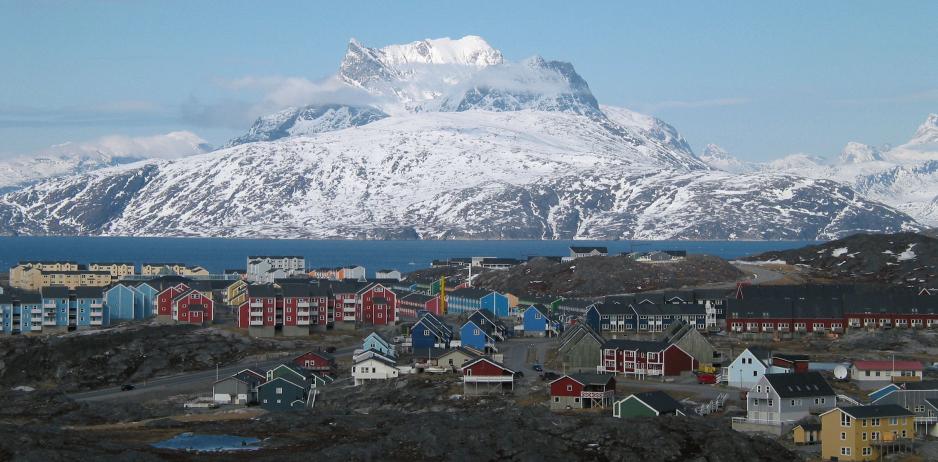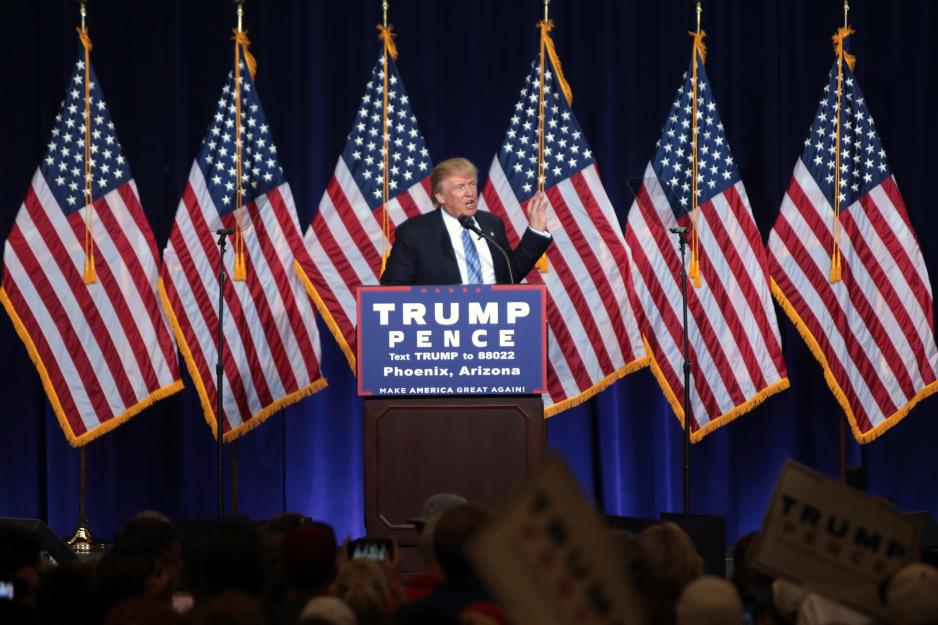Why Trump is looking to buy Greenland – even if it’s not for sale

Nuussuaq district in Nuuk, the capital of Greenland, with the Sermitsiaq mountain in the background. (Photo: Oliver Schauf / Wikimedia Commons)
Trump’s wish to purchase Greenland should not be taken seriously in a literal sense, but tells us a lot about the US’ interests in the Arctic region.
The reactions have been numerous after the Wall Street Journal and several other newspapers reported that President Trump with “various degrees of seriousness” repeatedly has expressed interest in purchasing Greenland.
On Sunday, Trump confirmed his interest in exploring the possibility of buying Greenland, saying that “essentially, it’s a large real estate deal” and that it “would be nice” from a strategic perspective.
Greenland is not Danish
Many have dismissed the news as a joke, such as former Prime Minister of Denmark Lars Løkke Rasmussen, who wrote on Twitter that “It must be an April fools day joke”. Greenland’s premier Kim Kielsen said in a statement that “Greenland is not for sale and cannot be sold”, and Greenland’s Ministry of Foreign Affairs tweeted “we’re open for business, not for sale”.
Greenland
Greenland is the world’s largest island with an total area of 2166 million km2 and a population of 56 000
Greenland was a Danish colony until 1953, when it became a country and a Danish province. It gained home rule in 1979 and has had self-government since 2009.
The 2009 Self Government Act, transferred more power from the Danish Government to the local Greenlandic government and Greenland can gradually assume responsibility for the political, judicial and economic system.
The Danish government remains in control of foreign affairs and defense. Denmark also retains control of the monetary policy and provides an annual subsidy
According to the 2009 Self Government Act, Greenland can declare full independence. Over the last years, there have been several calls for independence, but there is disagreement about whether this should happen slowly or sooner rather than later.
On Sunday, Danish Prime Minister Mette Fredriksen told the newspaper Sermitsiaq: “Greenland is not for sale. Greenland is not Danish. Greenland belongs to Greenland”.
But if we look beyond the jokes and neocolonial connotations, what does Trump’s wish to purchase Greenland say about the US’ interests and plans for the region?
High politics in the High North
According to Marc Jacobsen, a Senior Fellow at the Arctic Institute and a PhD Fellow at the University of Copenhagen, the idea to purchase Greenland should be seen from a high politics and geostrategic perspective.
“As Greenland has a huge geostrategic importance as part of both the Arctic and the North American continent – and hence is subject to the Monroe Doctrine – it is a priority to maintain and possibly enhance American presence, while keeping China at a distance”, says Jacobsen to High North News.
Greenland and Denmark already have an important security relationship to the US, and the US’ northernmost military base, the Thule Air Base, is located on the northwestern coast of Greenland.
Earlier this year, the US Embassy in Copenhagen announced that the US Department of State will reestablish a permanent presence in Nuuk.
Strategic competition in the Arctic
In the recent months, the US has updated several of its Arctic policy documents, including the Department of Defense and the Coast Guard’s Arctic strategies. What these documents have in common is the description of the Arctic as an area of strategic competition and singling out China and Russia as the biggest challenges to the continued peaceful stability of the region. US Secretary of State Mike Pompeo caused international reactions when he lashed out at both Russia and China in an unprecedented speech during the Arctic Council Ministerial in Finland earlier this year.

Donald Trump has referred to buying Greenland as a ”large real estate deal” (Photo: Gage Skidmore, CC BY-SA 2.0)
Trump’s sudden interest in the world’s largest island must be seen in the context of these developments.
Over recent years, Chinese companies have invested in Greenlandic mining projects, and in 2018, a Chinese firm bid on a contract for the expansion of airports on the island. This caused concern both in Denmark and the US, and led the then Danish Prime Minister Lars Løkke Rasmussen to intervene.
According to Ulrik Pram Gad, an Associate Professor at the University of Aalborg, the US interest in Greenland is nothing new, but now that the global interest in the Arctic is increasing, the US wants to show that it will defend what is theirs.
The US wants to get there before China or others get in the way of its interests.
He also adds that someone in the State Department must have caught on to the general development towards independence in Greenland. “The US wants to get there before China or others get in the way of its interests”, says Pram Gad to High North News.
The next step for Greenland is not to become the 51st state
The President and real estate developer’s inclination to buy Greenland could be seen as offensive to many Greenlanders.
“Donald Trump’s alleged idea of buying Greenland seems to be rooted in an outdated worldview, where colonial masters exchange pieces of land”, says Marc Jacobsen.
He explains that Greenland is a self-governing territory with a declared vision of future independence. “Next step for Greenland is more self-determination; not to become the 51st state”, says Jacobsen.
Pram Gad upholds this and says that Trump is “a 100 years late”. He also says that the US has arrangements with several Pacific islands, where it has veto powers in security matters and keeps naval bases. Based on this, it is unlikely that the US can give Greenland a better deal than it has with Denmark. Besides, he adds, “Greenland is not searching for buyers”.
A bargaining chip for Greenland?
In September, Trump will visit Copenhagen, where he will meet both the Danish Prime Minister and the Greenlandic Premier. Jacobsen argues that although Trump’s wish to purchase Greenland could be seen as a provocation, it also enhances the Greenlandic position in the negotiation room.
“While Greenland most certainly will not be sold to the United States, they could instead rent out parts of the country as seen with the Thule Air Base. However, Greenland today gains less economically from this arrangement than it used to, so the renewed attention from Trump can ultimately serve as a welcoming bargaining chip to re-establish what has been lost and possibly propose other initiatives that may both strengthen the US strategic presence and Greenland’s national economy”, says Jacobsen.
Donald Trump’s alleged idea of buying Greenland seems to be rooted in an outdated worldview.
Trump has said Sunday that buying Greenland is not “number one on the burner”, but as to how seriously we should take his interest, we will probably know more after his visit to Copenhagen in September.
“I think we shouldn’t take it seriously in the sense that it will ever happen or be acceptable to anyone, but we will probably hear more about it”, says Pram Gad.
“It doesn’t make any sense in practical politics, but it can create a lot of noise and disturbance on the way if Trump pushes this idea”, he adds.
